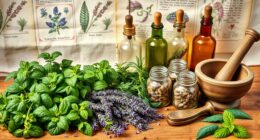We can become herbalists without attending medical school by exploring alternative paths that combine traditional knowledge with modern applications. To get started, we should understand herbal certification options, such as becoming a Registered Herbalist with the American Herbalists Guild, which demonstrates our commitment to the field. We can access herbal education through various schools and programs, covering topics like botany, plant identification, and preparations. Online platforms like HerbMentor offer flexible learning options, while institutions like the California School of Herbal Studies provide hands-on experience and mentorship. As we continue on this path, we'll uncover the most effective training and opportunities for a fulfilling career in herbalism.
Key Takeaways
• Become a Registered Herbalist with the American Herbalists Guild to demonstrate expertise and commitment to the field.
• Enroll in herbalism courses that cover traditional healing systems, Western herbalism, botany, and plant identification for comprehensive education.
• Gain hands-on experience through apprenticeships, online platforms like HerbMentor, and schools like California School of Herbal Studies for practical skills development.
• Develop strong foundations in herbal materia medica, communication skills, and business establishment with a focus on ethical practices and community outreach.
• Pursue education and training through formal education, apprenticeships, or self-study, and network within the herbal therapy community for success.
Understanding Herbal Certification Options
When exploring options for becoming a certified herbalist, we quickly discover that there's no federally recognized, licensed path to follow in the US. This lack of standardization can make it challenging to navigate the world of herbalism schools and herbal education.
Many schools offering certification upon graduation are, in fact, misleading, as they don't lead to official certification. Even reputable institutions like The Herbal Academy provide certificates of completion for their courses, but these aren't the same as official certification.
So, what's a budding herbalist to do? One option for recognition is becoming a Registered Herbalist with the American Herbalists Guild. This recognition signifies affirmation of ethical practice and expertise among peers in the herbal community. It's important to understand that becoming a Registered Herbalist is a notable achievement, demonstrating a high level of knowledge and commitment to the field.
As we explore further into the world of herbalism, it's crucial to separate fact from fiction and understand the nuances of certification options.
Herbalism Education and Training

As we explore the world of herbalism education and training, we're faced with a multitude of options to choose from, including formal programs, apprenticeships, and self-study.
We can opt for accredited herbalism schools that offer thorough programs covering clinical skills, materia medica, and herbal product making, or we can take advantage of online learning platforms like HerbMentor for affordable and flexible education.
Now, let's take a closer look at the various herbalism course options, online learning platforms, and apprenticeship opportunities available to us.
Herbalism Course Options
We've numerous herbalism course options to choose from, each offering a unique blend of theoretical foundations and practical applications.
When selecting a herbalism school, we consider programs that cover a range of herbal studies, from traditional healing systems like Ayurveda and Traditional Chinese Medicine to Western herbalism.
We can opt for online options, which provide flexibility in our learning schedule, or choose in-person apprenticeships that offer hands-on experience.
Herbal education encompasses a broad scope, including botany, plant identification, herbal preparations, and therapeutic uses of herbs.
We also delve into understanding contraindications, herb-drug interactions, and ethical considerations in practice.
Accredited universities and herbal schools provide diverse paths for herbal education without the need for medical school.
As we explore these options, we consider our learning style, career goals, and the type of herbal traditions we want to specialize in.
Online Learning Platforms
In addition to online learning platforms like HerbMentor, we can access a wealth of herbalism education and training from the comfort of our own homes, at our own pace. This flexibility is particularly useful for those who want to explore herbalism before committing to formal education or training programs.
HerbMentor, for instance, offers a range of courses covering clinical skills, materia medica, and herbal product making, making it an excellent resource for beginners and advanced herbalists alike. These online platforms provide an affordable and flexible way to gain herbal education, allowing us to learn at our own pace and convenience.
Additionally, they offer hands-on experience with plants and herbs through online herbalism courses and programs. As herbalists, we can leverage these platforms to enhance our skills and knowledge, whether we're just starting out or looking to expand our expertise. By utilizing online learning platforms, we can gain a solid foundation in herbalism and take our practice to the next level.
Apprenticeship Opportunities
In addition, by immersing ourselves in apprenticeships, we gain hands-on experience and direct mentorship from seasoned herbalists, accelerating our growth as skilled practitioners. This experiential learning approach allows us to develop practical skills in a real-world setting, which is essential for becoming a proficient herbalist.
Many herbal schools offer apprenticeship programs, providing us with opportunities to work alongside experienced herbalists and gain valuable insights into the profession. Through apprenticeships, we can refine our knowledge of herbal remedies, learn about different preparation methods, and develop our diagnostic skills. Furthermore, we'll have the chance to work with diverse clients, addressing various health concerns and developing personalized treatment plans.
Becoming a Registered Herbalist

To become a recognized expert in herbal medicine, one must meet the specific criteria set by the American Herbalist Guild, a prestigious title that signifies a high level of professionalism and dedication to standards within the herbal community.
As we work towards becoming Registered Herbalists, we're dedicated to upholding the highest standards of herbal medicine. This esteemed title acknowledges our expertise in herbal medicine and our commitment to ethical practice. We've undergone rigorous training, demonstrating proficiency in herbal knowledge and practice.
The American Herbalist Guild's strict criteria guarantee that Registered Herbalists possess a deep understanding of herbalism, from botany to pharmacology. By earning this title, we enhance our credibility and trustworthiness within the herbal community.
As Registered Herbalists, we're part of a community that prioritizes excellence, integrity, and a dedication to promoting the responsible use of herbal medicine. With this recognition, we're better equipped to provide high-quality care to our clients and contribute to the advancement of herbalism as a whole.
Herbalism Schools and Programs

In our pursuit to become experts in herbal medicine, we need to explore the various herbalism schools and programs that provide the necessary training and education to achieve our goal.
Herbalism schools like the California School of Herbal Studies offer thorough programs covering materia medica, plant identification, and clinical skills. Other programs, such as the Colorado School of Clinical Herbalism, focus on hands-on experience, herbal product making, and herbal pharmacy.
We're also drawn to schools like Ancestral Arts Apothecary in the Bay Area, which emphasizes traditional Western herbalism, plant spirit medicine, and ethical wildcrafting practices. Additionally, institutions like The Peoples Medicine School in upstate New York provide training in clinical herbalism, holistic health, and community herbalism.
Finally, the Northeast School of Botanical Medicine in New York offers in-depth studies in herbal therapeutics, plant energetics, and herbal medicine making.
Herbal Medicine Career Outlook

As we explore the herbal medicine career outlook, we're excited to discover that job opportunities abound, growth in healthcare demand is on the rise, and increasing public awareness is driving the industry forward.
With the herbal medicine market projected to reach over $100 billion by 2024, we're seeing a significant shift towards natural and holistic healing modalities.
From clinical practice to product development, education, research, and community outreach, the possibilities for a fulfilling career as a herbalist are vast and varied.
Job Opportunities Abound
We're entering a promising job market, with the global herbal medicine industry valued at over $80 billion and growing. As herbalism continues to gain recognition, we're seeing a surge in job opportunities across various settings.
We can find work in herbal product companies, wellness centers, spas, and integrative healthcare clinics, where our skills in herbalism can shine. The demand for skilled herbalists is on the rise as more people seek natural and holistic approaches to health and wellness.
We can specialize in areas like clinical practice, herbal product development, community education, or botanical research, offering a wide range of career prospects. With the herbal medicine industry projected to increase by 7.6% by 2025, we're entering a lucrative market that offers a promising future.
As we explore the world of herbal medicine, we find that it offers a unique blend of traditional knowledge and modern applications, making it an exciting time to be a part of this growing industry.
Growth in Healthcare Demand
With the healthcare landscape shifting towards natural and holistic approaches, demand for herbal medicine practitioners is skyrocketing. As we see a growing interest in alternative healthcare, the market for herbalists is expanding rapidly.
According to the American Botanical Council, sales of herbal dietary supplements in the US reached over $9 billion in 2020, indicating a significant market for herbalists. This growth in demand is driven by consumers seeking natural remedies and plant-based therapies to maintain their health and well-being.
As a result, herbal practitioners can find opportunities in various settings, such as wellness centers, herbal shops, clinics, and even start their own herbal product businesses. The increasing popularity of holistic healthcare is creating a lucrative career path for herbalists, allowing them to make a positive impact on people's health and well-being.
With the demand for herbal medicine practitioners on the rise, pursuing herbalist training can provide a fulfilling and lucrative career path without the need for attending medical school.
Increasing Public Awareness
What's fueling the increasing public awareness of herbal medicine, and how is it shaping a promising career outlook for aspiring herbalists? As we explore the world of herbalism, it's clear that the demand for herbalists is on the rise. The American Botanical Council reports that the herbal medicine industry has seen significant growth, with herbal supplements generating over $8 billion in revenue annually in the US.
This growth can be attributed to the increasing interest in complementary and alternative medicine. As a result, job opportunities in the field are expanding, and herbalists have various career options to choose from, including working in clinics, wellness centers, herbal product companies, or as independent consultants. Many herbalists are self-employed, allowing for flexible work arrangements and the opportunity to create their own herbal practices. To succeed in this field, networking within the herbal therapy community is essential.
Here are three key factors contributing to the increasing public awareness of herbal medicine:
- Growing demand for natural health solutions: Consumers are seeking alternative approaches to healthcare, driving the demand for herbal medicines.
- Increased recognition of herbal medicine's benefits: Research highlighting the efficacy of herbal remedies is raising awareness and credibility for the industry.
- Rise of holistic wellness practices: The growing popularity of wellness centers and spas is creating new opportunities for herbalists to practice their craft.
Is Herbalism Right for You?

When venturing into the world of herbalism, it's essential to ponder whether this holistic approach to health aligns with our personal values and goals. As we consider studying herbalism, we should ask ourselves: Are we drawn to the idea of using herbal remedies to promote wellness? Do we feel called to explore the ancient practice of using plants to heal the body and mind?
If so, we may find that herbalism is an ideal fit. With its rich history spanning over 5,000 years, herbalism offers a unique approach to health that resonates with many.
As we commence on this path, we'll discover diverse roles that herbalists can assume, from clinical practitioners to writers and botanists. Our educational journey can take various forms, including self-study, apprenticeships, or formal education in Western Herbalism, Ayurveda, or Traditional Chinese Medicine.
The American Herbalists Guild and American Botanical Council are valuable resources that can support us along the way. By reflecting on our motivations and goals, we can determine if herbalism is the right path for us.
Building a Career in Herbalism

As we start on a professional journey in herbalism, we're enthusiastic to translate our passion into a fulfilling career. Building a successful career in herbalism requires more than just a deep understanding of medicinal herbs and plants. We need to develop a strong foundation in herbal materia medica, understanding contraindications, and enhancing our communication skills.
Here are three essential steps to building a career in herbalism:
- Education and Training: Pursue formal education, apprenticeships, online courses, or self-study to gain a thorough understanding of herbalism.
- Develop Your Skills: Focus on developing a strong foundation in herbal materia medica, understanding contraindications, and enhancing your communication skills.
- Build Your Business: Establish a business that operates on ethical practices, community outreach, and providing educational content, even without formal certification.
Alternative Paths to Herbalism

While many of us may not have the opportunity to attend medical school, we're finding alternative paths to becoming herbalists that still allow us to pursue our passion.
We're exploring alternative paths to herbalism, which include self-study, apprenticeships, and formal education programs in herbalism. These paths provide us with the necessary tools and skills to succeed in the field.
For instance, herbalism schools like Northeast School of Botanical Medicine, California School of Herbal Studies, and Ancestral Arts Apothecary offer thorough training in clinical practice, product making, herb cultivation, and other essential skills.
Additionally, platforms like HerbMentor provide affordable online herbal education for those exploring herbalism before committing to formal training. Traditional herbal knowledge can also be passed down through generations or learned from community elders, providing a unique perspective on the field.
Frequently Asked Questions
Can I Be a Herbalist Without a Degree?
We're wondering, can we be herbalists without a degree? Absolutely, we can! Many successful herbalists practice without medical degrees, focusing on herbal knowledge and traditional healing methods, and we can too!
Can I Be a Self-Taught Herbalist?
"We weave wisdom from words, wisely venturing into self-taught herbalism, leveraging books, online courses, and practical experience to master plant identification, herbal properties, and safe usage, eventually becoming skilled practitioners."
What Is the Best Degree for a Herbalist?
We believe a Bachelor's or Master's degree in Herbal Medicine, Traditional Chinese Medicine, Naturopathy, or Botany with a focus on medicinal plants is the best degree for a herbalist, offering thorough training and a holistic approach to healing.
Is There Such a Thing as a Certified Herbalist?
We've learned that there's no federally recognized, licensed path for herbal certification in the US, so we're cautious of schools claiming certification; instead, we're looking into recognition as a Registered Herbalist with the American Herbalist Guild.
Conclusion
As we consider a career in herbalism, some of us may worry that it's a hobbyist's pursuit, lacking the rigor of traditional medicine. But, with the right training and certification, herbalism can be a respected profession.
By choosing a reputable herbalism program, gaining hands-on experience, and staying up-to-date on research, we can build a successful career in herbalism, one that's grounded in science and committed to helping others achieve wellness.










